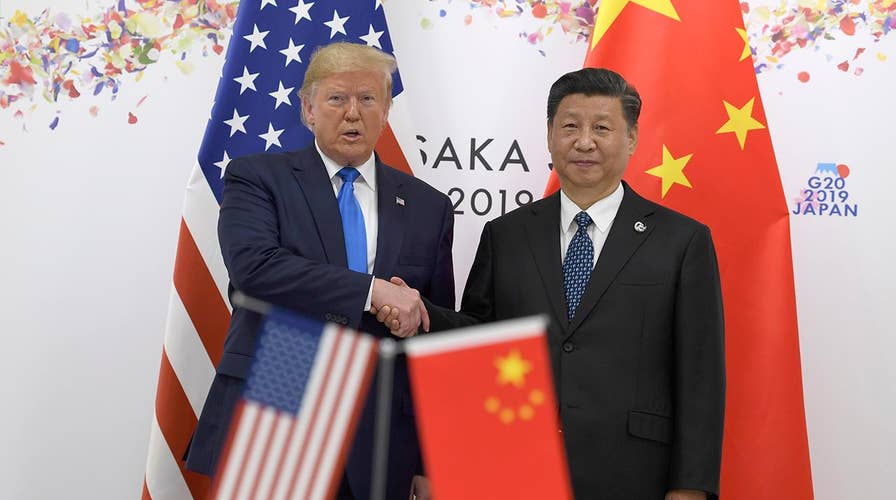China’s Xi Jinping is under real pressure: Christian Whiton
Former Trump State Department senior adviser Christian Whiton gives his take on the ongoing protests in Hong Kong.
It wasn’t supposed to be like this. When Xi Jinping effectively crowned himself emperor at the 19th Chinese Communist Party Congress in 2017, consolidating his power by ending a practice of term limits, China was supposed to be ready for its next stage of his meteoric rise.
In a triumphal speech, Xi heralded a “new era” of Chinese power and predicted the nation would become a “mighty force” under his control. But as the summer of 2019 drags on, Xi and the government he leads look increasingly weak and lost.
China’s economy is in the doldrums, put there in part by President Trump’s decision to change U.S. tactics dramatically in long-running trade disputes. Last month, the Chinese National Bureau of Statistics reported the slowest economic growth since 1992. China’s manufacturing index has indicated contraction for all but two months so far this year.
JAMES CARAFANO: WHAT HONG KONG UNREST TELLS US ABOUT CHINA'S PLANS FOR THE REST OF THE WORLD
In July, imports fell 5.6% compared to a year before, partly due to less demand for inputs to manufacturing that increasingly is moving out of China. (In the first quarter of this year, foreign investors pumped $10.8 billion into neighboring Vietnam, an increase of 86.2 percent.) China has also nationalized three banks since May with more bailouts expected as its overextended financial system faces extreme risk.
A fair assessment of the U.S.-China trade war shows Washington winning the dispute, although not everyone agrees. In his weekly New York Times column titled “China Tries to Teach Trump Economics,” progressive economist Paul Krugman argued that the president, “…vastly overrates his ability to inflict damage on China while underrating the damage China can do in return.”
In fact, Trump has proven that the opposite is true in imposing tariffs—for a simple reason. Last year, America imported $540 billion in goods from China and exported only $120 billion worth. As the far bigger customer in this relationship, the United States has the power. Even if Beijing stopped all $120 billion in U.S. imports, that amounts to only about half of one percent of U.S. GDP. The impact of tariffs on U.S. consumers has also been negligible. As the former CEO of Toys R Us recently explained, tariffs are “a fraction of a percent…on the average annual consumer basket.”
More from Opinion
Oddly Xi has conducted himself as though a trade deal would be a favor to Washington. In the lead-up to the G20 summit in Osaka in June, Xi was noncommittal as to whether he would deign to meet with Trump. When he did, his government quickly reneged on promises he made to buy more U.S. food.
Clearly Xi wants to stall past next year’s presidential election, hoping to outlast Trump. This itself is disingenuous for a country that is mythologized for long-term strategy and deep analysis of its adversaries: economic and historical factors favor Trump for reelection, and, regardless, the story of the decade is Washington’s bipartisan sea change in sentiment toward China.
And then there is Hong Kong. Beijing has gradually been eroding the relative autonomy it promised in repossessing the territory from Britain in 1997, as well as its agreement to allow free elections with universal suffrage. Given its congenital unwillingness to leave well enough alone, Beijing attempted to have its puppets in the territory allow extradition to the Mainland—effectively importing its political repression into a city that has long been effectively part of the West.
The result has been stunning. Massive demonstrations have continued throughout summer, most recently closing the airport. This in a city that supposedly cared singularly about money and where it was long said that only a tiny minority would do more than lament the erosion of freedom. Evidently not.
CLICK HERE TO GET THE OPINION NEWSLETTER
Worst of all for Beijing, while students and the young are the most active protesters, they are joined by Hong Kong residents from all walks of life—civil servants, bankers, flight attendants, teachers, and the like. The real crisis that events in Hong Kong pose is the question of whether Mainlanders are also poised to challenge the government.
Xi likely believes he can blow past demonstrations in Hong Kong as Beijing did amid smaller protests in 2014. But that doesn’t seem to be the case: average Hong Kong residents have decided that they must defend freedom now.
CLICK HERE TO GET THE FOX NEWS APP
Xi is unlikely to resort to a Tiananmen Square-style massacre with the People’s Liberation Army in a repeat of 1989. More probable is an invasion of Hong Kong with civilian or paramilitary police, some of whom are training next door in Shenzhen. But even this step would bring foreign condemnation, likely end free nations’ treatment of Hong Kong as a separate trade and customs entity from the Mainland, and curtail what is left of foreign investment in China. Put simply, Xi has painted himself into a corner.
The greatness Xi forecast in his 2017 ascension to paramount leader thus remains elusive. His tenure is marked by internal political turmoil that will be costly and difficult to control. China’s trade scheme is at risk, as is the broader economy, and with it, the rationale for having one-party communist rule in China. It’s a cruel summer.





















